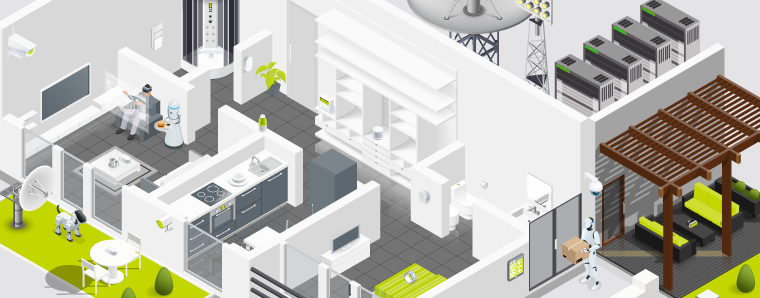The future looks bright with these small business tech trends.
The Consumer Electronics Show (CES) kicks off each year showcasing the coolest gadgets, also impacting small business tech trends. Every January for the past 50 years, this high-tech trade show has provided a jumping-off point for tech innovators. While most technologies highlighted at CES is aimed at consumer markets, they also can choreograph where workplace technology is headed.
Before the event, experts predicted what many of the new tech innovations would include. Bigger TVs with greater resolution. Rollable, foldable smartphones and 4K displays. Autonomous vehicles. Wearable tech. Robots. Smart refrigerators. But how are these advances going to help your small business? Here are a few CES trends we recommend you watch:
#1. Smarter commutes, smarter offices.
The current standard for wireless bandwidth—4G LTE—is already on its way out, making way for 5G. According to the CES presenters, 5G is 10 times faster than 4G LTE. This greater connectivity will make many upcoming innovations possible, enabling better device-to-device communication with shorter delays and improved battery life.
What that means is that the concept of the “smart home” is about to get smarter. In the very near future, the Internet of Things (IoT) will provide even more widespread touchless control over your house. But the tech leaders attending CES didn’t stop there. Many claimed that the concept of the smart home will expand to include the possibility of “smart cities.”
Ford Motors Co. announced a cloud-based platform intended to take in information that would support a city’s transportation system. The platform would allow stoplights, signs, and even cars and bikes, to speak to each other, swap information, and better identify and manage traffic. What that means is in the future, you probably won’t drive yourself to and from work. The car will drive by itself. Not only that—smart devices throughout the city will contribute to making your commute as quick and painless as possible.
Smarter homes and smarter cities also increase the push toward smarter offices. Just like in the smart home, the smart office will be populated by devices and tools that speak to each other. This will contribute to greater collaborative efforts between co-workers and richer customer experiences. For its part, Google introduced desktop PCs that came installed with a digital assistant (more on that later). Cisco also unveiled its new Infinite Video Platform, intending to provide best-in-class, secure video experiences to all devices.
#2. Virtual reality and augmented reality.
CES also featured improved virtual reality headsets that deliver higher resolution and improved audio feeds. Beyond the obvious improvements to gaming experiences, virtual reality also offers advantages to several industries. Surgeons can prepare themselves for surgery and explore what complications they might encounter as they work on a patient. Designers and engineers can use it to build virtual models rather than spend resources assembling actual, physical models.
VR is expected to change social media as we know it. Immersive virtual reality tech will change how your customers interact online, enabling them to meet in virtual spaces. That means that, in the future, your business won’t simply have a page on a social media platform. Instead, you’ll have a social media space. Customers will go there expecting to explore a range of interactive opportunities designed to educate them about your company.
Businesses also anticipate using VR technology to cut down on hardware costs. In the future, you won’t have to outfit a worker with a laptop, computer, monitor, or phone. All they’ll need is a VR headset. Once they slip that on, the headset will project a highly customizable desktop display in the air in front of them. With the display, workers will be able to make calls and access office applications, web browsers, video streaming, and more. This will also enable remote workers since employees can access their displays anywhere.
#3. Artificial intelligence and digital assistants.
The last few years at CES have seen the rise of artificial intelligence, usually in the form of digital assistants. The popularity of Apple’s Siri, Amazon’s Alexa, and Google Assistant has encouraged most innovators to incorporate AI into their devices. The plan is to make smart devices even smarter.
Amazon currently dominates this market, but Google managed to wow CES attendees with its answer to the Echo Show. The company unveiled a line of smart displays that include Google Assistant. The displays give consumers voice-activated access to photos, calendars, video conferencing, and Google’s range of services.
Previously, Amazon and Google have marketed their digital assistants exclusively for home use. But the office applications are obvious. Imagine a day when each employees, like Tony Stark, can offload time-consuming tasks to their own personal Jarvis.
The future of small business technology and the Cloud.
For tech innovators, CES is a chance to check out the competition, and to show off your latest advances. For consumers, it’s a front-row seat to the tech wars—a fun gadget-fest. It’s also a chance to preview possible small business tech trends coming down the pike.
As our devices become smarter and transform our living and work spaces, they also become more reliant on the Cloud. This tech trend has inspired several companies to update their various tools and applications to cloud-based systems. Check out our whitepaper to discover the benefits of moving your business phone system to the Cloud.


